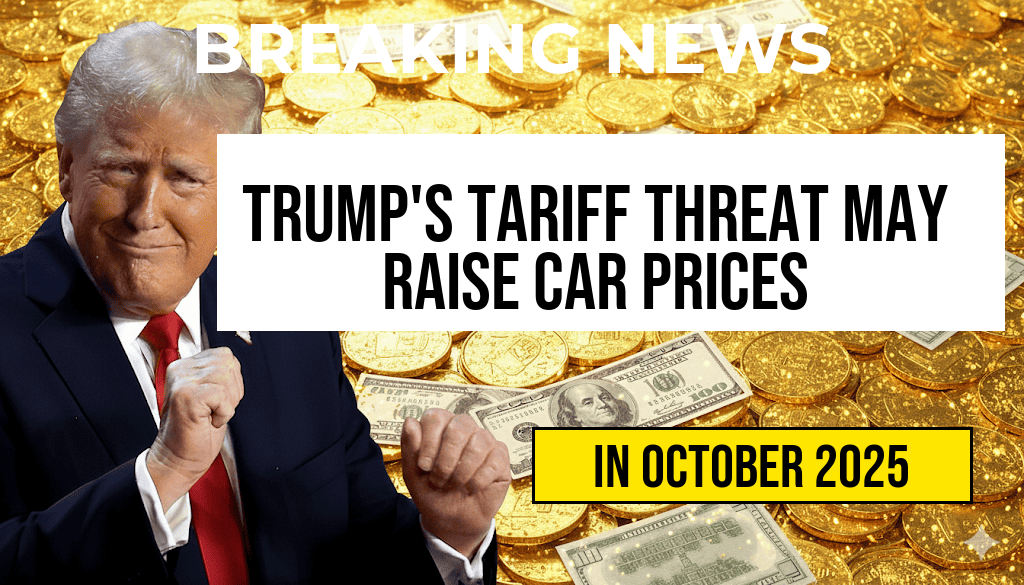Potential changes in U.S. trade policy under President Donald Trump could significantly impact the automotive market, with analysts warning that proposed tariff threats might lead to substantial increases in vehicle prices. Recent statements from the administration suggest the possibility of imposing new tariffs on imported vehicles and auto parts, aiming to bolster domestic manufacturing. However, industry experts caution that such measures could ripple through the supply chain, elevating costs for consumers and potentially adding as much as $5,286 to the average price of a new car. This development comes amid ongoing debates over trade strategies and economic protectionism, raising questions about the broader effects on the automotive sector and consumer affordability.
Background on Tariff Policies and Automotive Imports
The United States has a long history of imposing tariffs on imported goods to protect domestic industries. Historically, tariffs on vehicles and auto parts have fluctuated based on political and economic considerations. In recent years, the U.S. has maintained a 2.5% tariff on imported passenger vehicles and a 25% tariff on certain auto parts, according to data from the Wikipedia page on auto imports. These tariffs aim to support American automakers but have often been criticized for raising consumer prices and limiting market competition.
Trump’s Tariff Threats and Industry Response
During his presidency, Donald Trump frequently threatened to impose tariffs on foreign vehicles, citing national security concerns and unfair trade practices. While some tariffs were enacted temporarily, the threat of new or expanded tariffs remains a potent political tool. Recent statements from Trump and his administration indicate a willingness to revisit tariffs if trade negotiations do not yield favorable terms, particularly with key trading partners like China and the European Union.
Automakers and industry associations have expressed mixed reactions. Some warn that increased tariffs could trigger a cascade of price hikes, disrupt supply chains, and dampen sales. Others argue that such measures could incentivize reshoring manufacturing and bolster the U.S. auto industry in the long term. Nevertheless, the immediate concern remains the potential for higher costs to reach consumers.
Projected Price Increases and Consumer Impact
| Vehicle Type | Current Average Price | Potential Price Increase | Total Estimated Cost |
|---|---|---|---|
| New Car (average) | $37,000 | $5,286 | $42,286 |
| Luxury Vehicle | $60,000 | $5,286 | $65,286 |
| Compact Car | $20,000 | $2,857 | $22,857 |
Experts from the Forbes analysis estimate that if tariffs increase by 25% on imported vehicles and auto parts, consumers could see an average increase of up to $5,286 on new cars. This figure varies based on the vehicle’s base price, with luxury models experiencing higher absolute increases, while smaller economy vehicles see more modest hikes.
Potential Market and Economic Ramifications
Consumer Spending and Market Dynamics
Higher vehicle prices could dampen consumer demand, especially as rising interest rates and inflation already strain household budgets. Car buyers might delay purchases or opt for used vehicles, which could see price pressures from increased demand. A slowdown in new vehicle sales could ripple through automaker revenues, potentially leading to layoffs and reduced investment in innovation.
Supply Chain and Manufacturing Shifts
Tariffs often incentivize automakers to shift production closer to home or source components domestically. This could encourage reshoring efforts, but such transitions typically involve significant upfront costs and logistical challenges. Moreover, any disruption in global supply chains might lead to shortages of certain vehicle models or parts, further elevating prices.
Industry Outlook and Consumer Advice
Automotive analysts recommend that prospective buyers stay informed about ongoing trade negotiations and potential policy shifts. While tariffs tend to be politically motivated, their economic consequences can be immediate and tangible. Consumers seeking to purchase new vehicles in the near term should consider locking in prices or exploring alternative financing options before any potential price hikes take effect.
Meanwhile, automakers are preparing for various scenarios, including potential supply chain adjustments and pricing strategies. Industry insiders advise monitoring official announcements from the Department of Commerce and trade authorities to better understand how tariffs may evolve and influence the market.
Additional Resources
Frequently Asked Questions
What is the main concern regarding Trump’s tariff threat on new cars?
The primary concern is that the tariff threat could lead to an increase in vehicle prices by up to $5,286, making new cars more expensive for consumers.
How might tariffs impact car prices for consumers?
Tariffs on imported vehicles and auto parts can raise production costs for manufacturers, which are often passed on to buyers in the form of higher car prices.
Which types of vehicles are most likely to be affected by these tariffs?
Imported cars and auto parts from countries subject to tariffs are most likely to see price increases, especially if manufacturers rely heavily on international supply chains.
Could this tariff threat influence car buying decisions?
Yes, the potential for increased vehicle prices might encourage consumers to buy earlier or consider alternative options like used cars or domestically produced models.
What should consumers consider in light of this tariff threat?
Consumers should stay informed about tariff developments and consider pricing trends and availability when planning a car purchase in the near future.

Leave a Reply